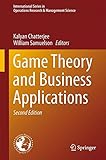Game Theory and Business Applications / edited by Kalyan Chatterjee, William Samuelson.
Tipo de material: TextoSeries International Series in Operations Research & Management Science ; 194Editor: Boston, MA : Springer US : Imprint: Springer, 2014Edición: 2nd ed. 2014Descripción: vI, 409 páginas 8 ilustraciones recurso en líneaTipo de contenido:
TextoSeries International Series in Operations Research & Management Science ; 194Editor: Boston, MA : Springer US : Imprint: Springer, 2014Edición: 2nd ed. 2014Descripción: vI, 409 páginas 8 ilustraciones recurso en líneaTipo de contenido: - texto
- computadora
- recurso en línea
- 9781461470953
- HD30.23
Springer eBooks
Introduction -- Game Theory Models in Finance -- Game Theoretic Models in Accounting -- GT and Marketing -- Game Theoretic Models in Operations Management and Information Systems -- Incentive Contracting and Franchise Decisions -- Game Theory and the Practice of Bargaining -- GT Models of Settlement and Litigation -- GT and the Law -- Cooperation in R&D -- A GT Model of Tenure -- GT and Experimental Economics -- Auctions in Theory and Practice -- Auctions and Bidder Collusion.
Game theory has been applied to a growing list of practical problems, from antitrust analysis to monetary policy; from the design of auction institutions to the structuring of incentives within firms; from patent races to dispute resolution. The purpose of Game Theory and Business Applications is to show how game theory can be used to model and analyze business decisions. The contents of this revised edition contain a wide variety of business functions – from accounting to operations, from marketing to strategy to organizational design. In addition, specific application areas include market competition, law and economics, bargaining and dispute resolution, and competitive bidding. All of these applications involve competitive decision settings, specifically situations where a number of economic agents in pursuit of their own self-interests and in accordance with the institutional “rules of the game” take actions that together affect all of their fortunes. As this volume demonstrates, game theory provides a compelling guide for analyzing business decisions and strategies.
Para consulta fuera de la UANL se requiere clave de acceso remoto.


